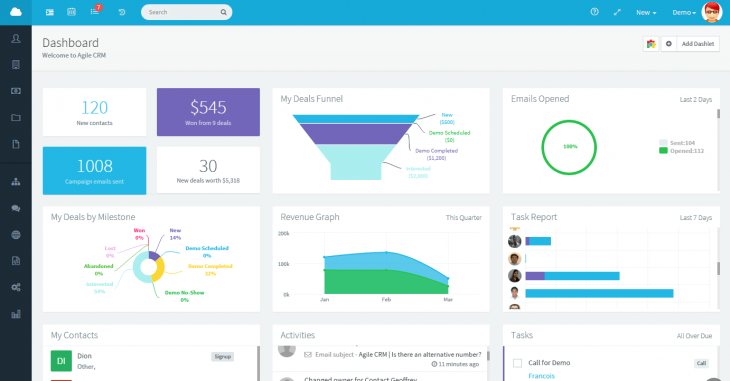
Post summary:
- Finding customers for your business is not easy. And once you find them, there comes another challenge – Establishing and maintaining strong relationships with them.
- CRM software helps you centralize, optimize and streamline your communication. The better you know your customers, the stronger your relationships will be with them.
- Here, we share 6 CRM benefits that focus on key customer relationship areas, allowing you to offer high-quality, consistent and timely interactions with your customers.
We’ve all heard about CRM, which stands for Customer Relationship Management.
Customers are important as no business exists without its customer base. And, of course, the way a company manages its customer database determines its business success.
But, let’s talk about the “R” in “CRM”.
Relationships are, by far, the most important part of the trendy acronym – CRM.
Why? Because relationships are a bridge between your business offering and your customer needs.
In fact, the majority of businesses that consider adopting a CRM system, first and foremost, are looking for a way to improve the quality and consistency of their relationships with customers and build customer loyalty.
This means that they want to improve their core business processes – managing contact information and streamlining their relations with customers.
According to Software Advice, contact management is the number one feature that is requested by 94% of CRM users, followed by the ability to track customer interactions (80%) and schedule tasks and set up reminders (85%).
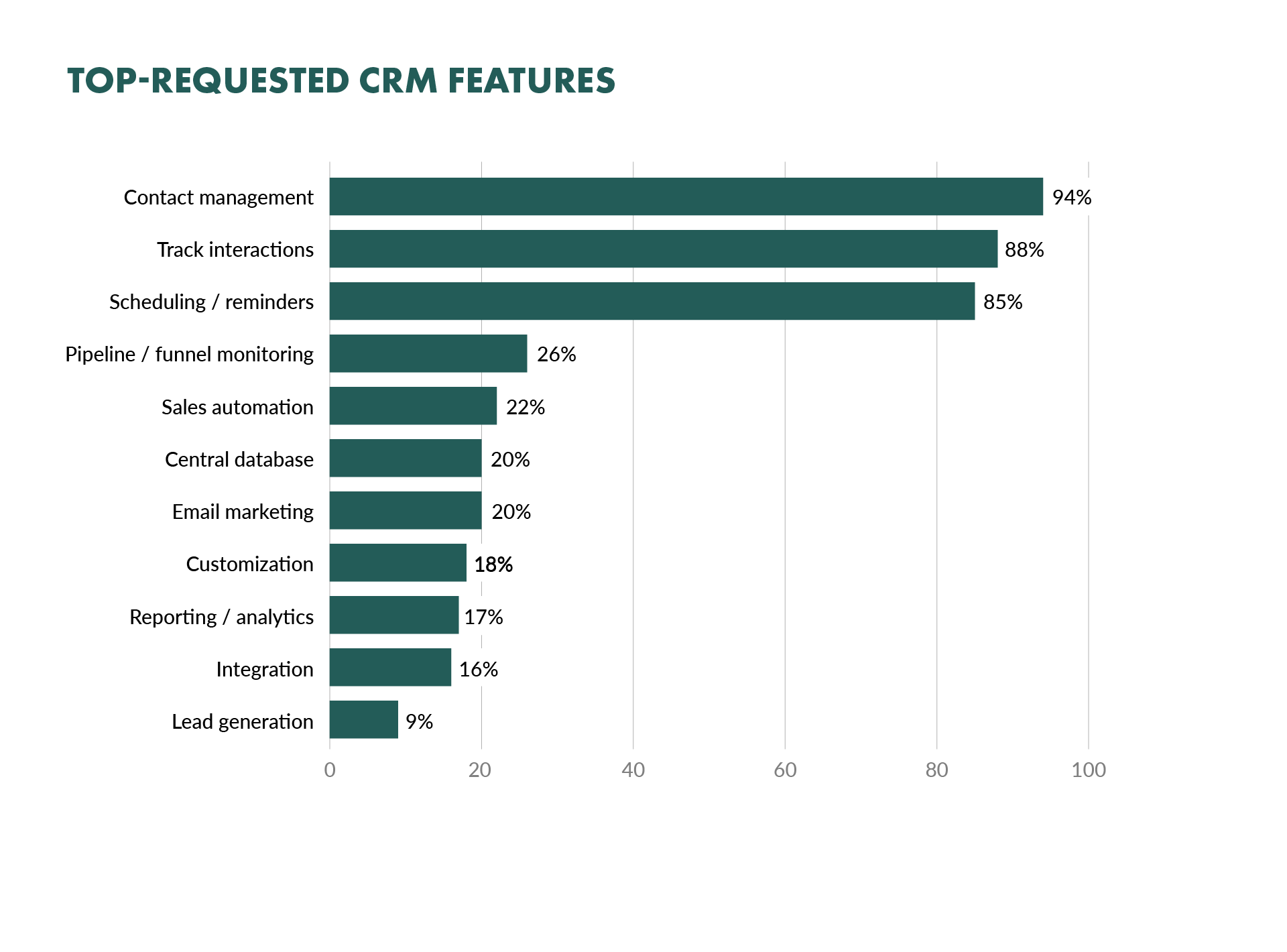
Source
Yet, when describing the benefits of a CRM software, very often “CRM evangelists” tend to focus on how the system can help you increase revenue, manage your sales pipeline, catch and nurture leads, send better marketing campaigns, manage your team, run customer service reports, and even analyze data.
And they are 100% correct – a good CRM system helps you do all that!
But … it seems like they fail to notice the elephant in the room – they spend little time addressing the greatness of CRM’s basic (yet key) functionality – contact management!
Better relationships = higher customer satisfaction
As your company grows, so does your customer database.
Eventually it becomes more and more difficult to centralize and streamline your communications with customers, both potential and existing.
Important conversations are hidden in emails, scattered around in spreadsheets, lost on Post-it notes, leading to patchy and inconsistent interactions with customers.
All of this leads to – simply and plainly – you losing money.
But, worry not!
Studies show that the answer to this problem could be a CRM system.
Apart such trending benefits, as increasing sales by 30% and shortening the sales cycle, a CRM system can help businesses improve customer retention and satisfaction rates, studies show.
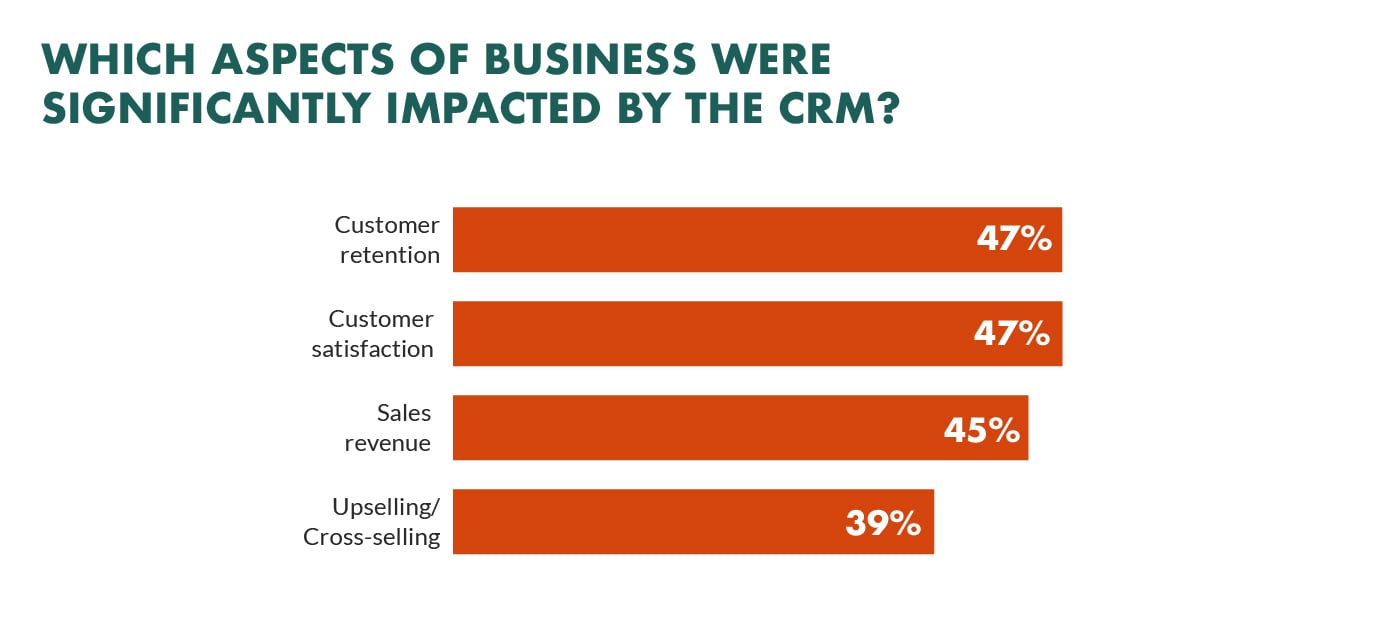
So, let’s take a look at the key benefits of CRM and how it can take your relationships with customers to “another level” – the level of full satisfaction, aka customer loyalty.
6 CRM benefits to make your customer relationships better
How satisfied are you with your customer satisfaction rates? (pun intended)
I’m not just talking about the customer service you provide, but rather the quality of your daily interactions with customers.
To find out, here is a little survey for you:
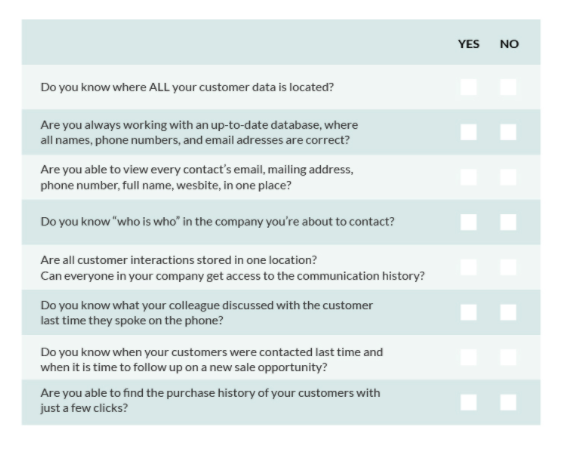
If you answered ‘NO’ to any of these questions, chances are your business is suffering from a disorganized or ineffective contact management, which strongly impairs the quality and consistency of your relationships with customers and prospects.
A CRM system can benefit your business by helping you centralize, optimize and streamline your communications with customers, and become better in these 6 areas.
1. Better knowledge of customers
As simple as it may sound, but a mere fact that you have all information stored on each contact in one place makes CRM a super powerful communication tool.
Like a cheat-sheet offering easy access to key information, a CRM system gives your sales, marketing and customer service teams a competitive advantage.
Not only do they know a contact’s full name, email address, telephone number, postal address, website and social media accounts, but also such critical business facts as a contact’s position in the company, his/her relations to other contacts in your database, the language they speak, and even their birthdays.
With all this information at your fingertips, personalizing your communication with a contact becomes a breeze.
Secondly, with the help of CRM you can save all activities, projects, sales, live chat messages, email exchanges, invoices, orders, contracts, or customer service requests that a contact has ever been involved in.
In other words, a CRM system allows you to know better who your contacts are and what they want.
2. Better segmentation
Nobody wants to do business with a faceless crowd. Everybody wants to deal with a perfect audience.
You can do it by segmenting contacts (customers and prospects) into target audiences. And there’s hardly anything else out there that does segmentation better than a CRM.
CRM allows you to break down data by categories and criteria, making it easy to create focused lists. Used in sales and marketing, such segmented lists allow you to run specific customer marketing campaigns (and account-based marketing campaigns) and analyze your sales process and lead pool.
When you know whom you’re addressing, you can consciously tailor your offer, your tactics, and even your sales pitch!
In a nutshell, a good CRM system helps you know better who is really interested in what you have to offer, who is still being on the fence, and who’s cold as ice.
3. Better customer retention
Apart from being a great asset in finding and nurturing your potential and new customers, CRM is also a great tool for keeping your existing customers happy.
A CRM system comes up with a handful of “customer retention” benefits: it will help you keep your promises by reminding you about appointments or when to send follow up emails.
But what makes the real trick here is that CRM can also prompt you to reach out to those customers who have not been contacted in while, and perhaps feel neglected.
After all, keeping an existing customer is 6 or 7 times cheaper that getting a new one, claims the report by Frederick Reichheld of Bain & Company.
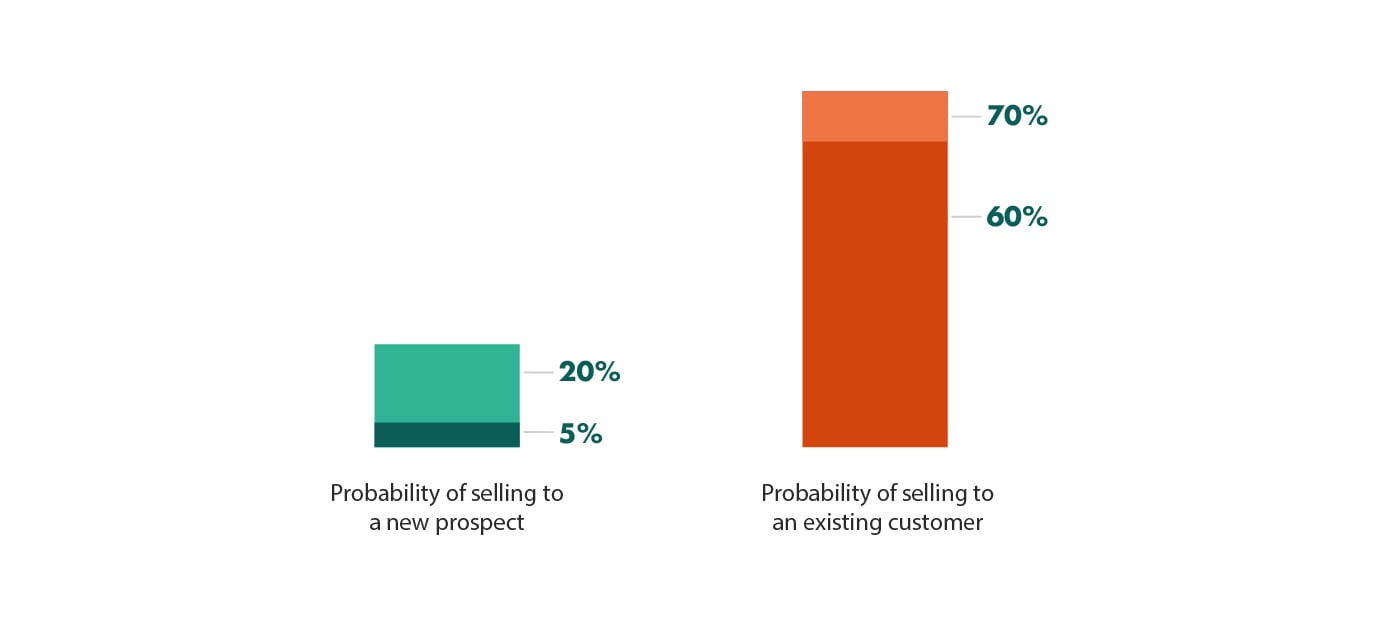
To sustain your customers’ interest, a CRM system can also help you orchestrate your marketing activities: send email campaigns, free trial offers or post-purchase customer surveys, etc. – all at the right time!
4. Better anticipation of needs
We feel more confident when we know what to expect.
The same applies to business. It’s easier to cross-sell or upsell a customer when you’ve been tracking their buying habits.
And since one of the key benefits of having a CRM system is to help salespeople sell more and sell faster, it is the access to customer interaction history through the entire customer journey that allows sales reps to anticipate customer needs.
If you know the contact’s purchase history – what they bought and when, what contracts they were offered, what buying habits they demonstrated, and even how they became your customers, you can be proactive and come up with new or better offers at the right time!
A CRM system is also indispensable in providing great customer service. The access to interaction history makes it easy to offer timely customer service.
Just a few clicks and you know whether a contact had any problems with your product, how their service requests were handled, and whether they were satisfied or not. And if they complained about something in the past – it’s your chance to redeem your reputation and offer a much better customer experience.
5. Better and speedier communication
Not making your customers wait by quickly replying to their requests is a sign of professionalism.
Saving yours and your customers’ time is the CRM system, which offers you a set of customizable, ready-to-use email templates, letters, documents, proposals, quotes, invitations, newsletters, etc.
Speaking of ready-made templates, here’s one for you.
Our most recent edition of the Customer Service Benchmark Report found that 90% of companies do not use autoresponders to acknowledge they have received a customer service email.
Simply copy the template below and upload it in your CRM system to stand out from the competition:
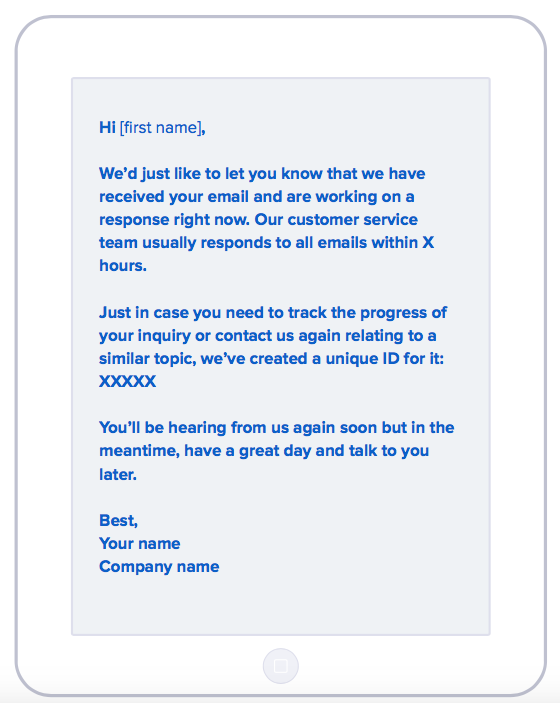
Another benefit is that a CRM system can also help you draft SMS and emails and schedule their dispatch weeks or months in advance.
And when it comes to dealing with customer service requests, speed is everything!
With all contact interaction history just a click away, CRM allows you to personalize your communication, send replies offering quick solutions to recurrent problems, send links to FAQs and videos, not to mention that phone calls can be made straight from the system.
6. Better protection of data privacy
Finally, let’s address the “buzzword” of the last few years – the General Data Protection Regulation (GDPR)!
In order to comply with the data privacy requirements of the new EU regulation, it’s über important to have a CRM software that has inbuilt GDPR-related functionality.
The main benefit of CRM here is that it will save you a lot of time and effort, as being GDPR compliant is a job in itself, not to mention all the unpleasant legal consequences if you violate this privacy law.
With GDPR, it’s better to be safe than sorry.
A CRM system can help you obtain and document your contacts’ permission to store and use their personal details (consents), send automatic notifications to all new contacts informing that you would like to store their data, manage your customers’ subscription to email communication preferences, and even set up rules to update personal details for groups of contacts – all at one time.
Doing this all manually will take most of your time and you also run the risk of making mistakes. But, setting up a CRM system to do that for you is a quick, safe and reliable way to make your communications with customers GDPR compliant, which in turn builds trust as you handle your customers’ data with respect.
Customer relationships as a business priority
A customer is more than just a sales opportunity.
You can have the most amazing product to offer, but if you don’t treat your customers right, you won’t sell a thing!
That’s why building good relationships with them is every business’ number one priority.
And this is exactly what a CRM does best – helps you maintain great relationships with customers, by treating each and every one individually, not forgetting about them, and being there when they need you.
